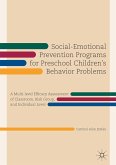Susanne A. Denham, Rosemary Burton
Social and Emotional Prevention and Intervention Programming for Preschoolers (eBook, PDF)
73,95 €
73,95 €
inkl. MwSt.
Sofort per Download lieferbar

37 °P sammeln
73,95 €
Als Download kaufen

73,95 €
inkl. MwSt.
Sofort per Download lieferbar

37 °P sammeln
Jetzt verschenken
Alle Infos zum eBook verschenken
73,95 €
inkl. MwSt.
Sofort per Download lieferbar
Alle Infos zum eBook verschenken

37 °P sammeln
Susanne A. Denham, Rosemary Burton
Social and Emotional Prevention and Intervention Programming for Preschoolers (eBook, PDF)
- Format: PDF
- Merkliste
- Auf die Merkliste
- Bewerten Bewerten
- Teilen
- Produkt teilen
- Produkterinnerung
- Produkterinnerung

Bitte loggen Sie sich zunächst in Ihr Kundenkonto ein oder registrieren Sie sich bei
bücher.de, um das eBook-Abo tolino select nutzen zu können.
Hier können Sie sich einloggen
Hier können Sie sich einloggen
Sie sind bereits eingeloggt. Klicken Sie auf 2. tolino select Abo, um fortzufahren.

Bitte loggen Sie sich zunächst in Ihr Kundenkonto ein oder registrieren Sie sich bei bücher.de, um das eBook-Abo tolino select nutzen zu können.
- Theoretical foundations, explanations and practical guides for implementation of social and emotional programming in early childhood settings
- Review of all extant programming for both in-class and parenting applications to further social and emotional development during early childhood
- Chapters presenting the major components of emotional competence are followed directly by another chapter detailing applications, or "lessons from the field."
- Geräte: PC
- ohne Kopierschutz
- eBook Hilfe
- Größe: 32.17MB
Andere Kunden interessierten sich auch für
![Practitioner's Guide to Emotion Regulation in School-Aged Children (eBook, PDF) Practitioner's Guide to Emotion Regulation in School-Aged Children (eBook, PDF)]() Gayle L. MacklemPractitioner's Guide to Emotion Regulation in School-Aged Children (eBook, PDF)40,95 €
Gayle L. MacklemPractitioner's Guide to Emotion Regulation in School-Aged Children (eBook, PDF)40,95 €![Social-Emotional Prevention Programs for Preschool Children's Behavior Problems (eBook, PDF) Social-Emotional Prevention Programs for Preschool Children's Behavior Problems (eBook, PDF)]() Catrinel Alice StefanSocial-Emotional Prevention Programs for Preschool Children's Behavior Problems (eBook, PDF)73,95 €
Catrinel Alice StefanSocial-Emotional Prevention Programs for Preschool Children's Behavior Problems (eBook, PDF)73,95 €- -23%11
![Integrative Supervision, Meta-Consulting, Organisationsentwicklung (eBook, PDF) Integrative Supervision, Meta-Consulting, Organisationsentwicklung (eBook, PDF)]() Hilarion PetzoldIntegrative Supervision, Meta-Consulting, Organisationsentwicklung (eBook, PDF)99,99 €
Hilarion PetzoldIntegrative Supervision, Meta-Consulting, Organisationsentwicklung (eBook, PDF)99,99 € ![Temperament (eBook, PDF) Temperament (eBook, PDF)]() Diana Wright GuerinTemperament (eBook, PDF)73,95 €
Diana Wright GuerinTemperament (eBook, PDF)73,95 €![Day Treatment for Children with Emotional Disorders (eBook, PDF) Day Treatment for Children with Emotional Disorders (eBook, PDF)]() Day Treatment for Children with Emotional Disorders (eBook, PDF)40,95 €
Day Treatment for Children with Emotional Disorders (eBook, PDF)40,95 €![Asperger Syndrome (eBook, PDF) Asperger Syndrome (eBook, PDF)]() Asperger Syndrome (eBook, PDF)113,95 €
Asperger Syndrome (eBook, PDF)113,95 €![Conduct Disorders and Severe Antisocial Behavior (eBook, PDF) Conduct Disorders and Severe Antisocial Behavior (eBook, PDF)]() Paul J. FrickConduct Disorders and Severe Antisocial Behavior (eBook, PDF)40,95 €
Paul J. FrickConduct Disorders and Severe Antisocial Behavior (eBook, PDF)40,95 €-
-
-
- Theoretical foundations, explanations and practical guides for implementation of social and emotional programming in early childhood settings
- Review of all extant programming for both in-class and parenting applications to further social and emotional development during early childhood
- Chapters presenting the major components of emotional competence are followed directly by another chapter detailing applications, or "lessons from the field."
- Review of all extant programming for both in-class and parenting applications to further social and emotional development during early childhood
- Chapters presenting the major components of emotional competence are followed directly by another chapter detailing applications, or "lessons from the field."
Dieser Download kann aus rechtlichen Gründen nur mit Rechnungsadresse in A, B, BG, CY, CZ, D, DK, EW, E, FIN, F, GR, HR, H, IRL, I, LT, L, LR, M, NL, PL, P, R, S, SLO, SK ausgeliefert werden.
Produktdetails
- Produktdetails
- Verlag: Springer US
- Seitenzahl: 251
- Erscheinungstermin: 6. Dezember 2012
- Englisch
- ISBN-13: 9781461500551
- Artikelnr.: 43987373
- Verlag: Springer US
- Seitenzahl: 251
- Erscheinungstermin: 6. Dezember 2012
- Englisch
- ISBN-13: 9781461500551
- Artikelnr.: 43987373
- Herstellerkennzeichnung Die Herstellerinformationen sind derzeit nicht verfügbar.
Susanne Denham received her Ph.D. in applied developmental psychology in 1985, after 11 years as a school psychologist. Her research involves social-emotional development, particularly in preschoolers. She is following a longitudinal sample of children she has known since age 3 - examining their emotional competence, its socialization, and its contribution to social competence - and is also studying a little-studied aspect of children's development - forgiveness. With Dr. Burton, she spearheaded a successful social-emotional prevention program for daycare children in Northern Virginia in the early 1990s.
Rosemary Burton received her Ph.D. in education in 1995, after years as both an early childhood teacher and daycare director. She trains myriad teachers in her role as director of operations for Minnieland Private Day Schools throughout several states, as well as in her role as community college professor, and in these roles has promoted social-emotional prevention and intervention programming for preschoolers as a vital enterprise.
Rosemary Burton received her Ph.D. in education in 1995, after years as both an early childhood teacher and daycare director. She trains myriad teachers in her role as director of operations for Minnieland Private Day Schools throughout several states, as well as in her role as community college professor, and in these roles has promoted social-emotional prevention and intervention programming for preschoolers as a vital enterprise.
1. Introduction: The Importance of Emotional and Social Competence.- 1.1. Introduction.- 1.2. Experience and Expression of Emotions.- 1.3. Understanding Emotions.- 1.4. Emotion Regulation.- 1.5. Emotional Competence: Developmental and Individual Differences.- 1.6. Socialization of Emotional and Social Competence.- 1.7. Social Competence and Social-Emotional Learning (Sel).- 1.8. Summary and Conclusion.- 2. Targeting Programs for Preschool Emotional and Social Competence.- 2.1. Introduction.- 2.2. Sel Goals.- 2.3. How do We Reach These Sel Goals?.- 2.4. Behavior Problems and Social INCompetence.- 2.5. Sel Programming for Young Children.- 2.6. Summary and Conclusion.- 3. Preschoolers' Attachment and Emotional Competence.- 3.1. Introduction to Attachment as Foundational for Emotional Competence.- 3.2. Early Attachment Classifications and Their Sequelae.- 3.3. Attachment and Emotional Competence.- 3.4. Attachments Beyond the Child-Parent Relationship.- 3.5. Principles for Practitioners.- 3.6. Summary: Attachment as Foundation for Sel.- 3.7. Conclusions: What Can We Do?.- 4. Applications Centered on Attachment: Lessons from the Field.- 4.1. Introduction to Sel Programming.- 4.2. Attachment Theory in the Preschool Classroom.- 4.3. Teaching Teachers About Building Attachment Relationships.- 4.4. Teaching Parents about Attachment and Floor Time.- 4.5. Summary and Conclusions.- 5. Guiding Preschoolers'Behavior: Short-Term Meanings, Long-Term Outcomes.- 5.1. Introduction: Foundations and Methods of Guidance in Early Childhood.- 5.2. Guidance: Where Do We Start?.- 5.3. Specifics for Guiding Behavior.- 5.4. Summary and Conclusions.- 6. Teaching Teachers about Guidance: Lessons from the Field.- 6.1. Introduction: The Needs of Teachers and children.- 6.2. Training Teachers to useIndirect Guidance.- 6.3. Using Direct Guidance.- 6.4. Reflection on Guidance and Time for Practice.- 6.5. Summary and Conclusions.- 7. Emotion Understanding and Emotion Regulation.- 7.1. Emotion Understanding.- 7.2. Emotion Knowledge and Social Interaction.- 7.3. Emotion Regulation.- 7.4. Emotion Regulation and Sel.- 7.5. Summary and Conclusion.- 8. Applications Centered on Emotional Competence: Lessons from the Field.- 8.1. Introduction.- 8.2. Emotion Understanding.- 8.3. Emotional Expressiveness and Emotion Regulation.- 8.4. Notes from the Field: How We have Worked with Teachers to Implement Practices Centered on Emotional Competence.- 9. Social Problem Solving.- 9.1. Introduction: Thinking about Getting along with Each Other.- 9.2. Focus on Social Problem Solving in Preschoolers.- 9.3. Summary and Conclusions.- 10. Social Problem-Solving Applications: Lessons from the Field.- 10.1. Introduction: Teaching Social Problem Solving and Positive Social Behaviors to Preschoolers.- 10.2. Social Problem-Solving Programming.- 10.3. Teachers Learn about Social Problem Solving-Moving from Hypothetic al to Real.- 10.4. Social Competence Revisited: Relationship Skills.- 10.5. Summary and Conclusions.- 11. Improving Children's Emotional Competence: Parenting Interventions, Written By Sophie Havighurst.- 11.1. Introduction to Parenting Sel Interventions.- 11.2. The Influence of Parenting on Children's Emotional Competence: A Conceptual Framework.- 11.3. Universal Parenting Programs that Build Children's Emotional Competence.- 11.4. Emotion-Focused Parenting Programs for High-Risk Children.- 11.5. Self-Help Books for Parents.- 11.6. Essential Parenting: A Program to Build Children's Emotional Competence.- 11.7. Emotion coaching in the "Heat of the Moment": Epreic andChidren's Regulation of Emotions and Emotion-Related Behavior.- 11.8. Epreic and Social Problem Solving.- 11.9. Epreic is for Parents, too: Parent Emotional Self Care and Emotional Regulation.- 11.10. Final Thoughts on the Epreic Program..180.- 11.11. Research Evaluation of Epreic.- 11.12. Future Directions.- 11.13. Summary and Conclusions.- 12. Assessing Emotional and Social Competence during Preschool Years.- 12.1. Introduction.- 12.2. Emotional Competence Assessment.- 12.3. Social Competence Assessment.- 12.4. Social Competence/Emotional Competence "Combined Assessment".- 12.5. Assessment of Behavioral Problems.- 12.6. Summary and Conclusions: Recommendations about Preschool Social-Emotional Assessment.- 13. What "Works": Summarizing Our Lessons from the Field.- 13.1. Overall Considerations.- 13.2. What Works: Prevention Principles Applied to Programs Reviewed Here.- 13.3. What Works: Requirements for Early Childhood Sel Programming.- 13.4. What "Works": How Well Do Programs Reviewed Here Fare?.- 13.5. Gaps in Science and Practice: Where We Need to know more, What "Doesn't Work".- 13.6. Synthesis - Dream to Reality.- References.
1. Introduction: The Importance of Emotional and Social Competence.- 1.1. Introduction.- 1.2. Experience and Expression of Emotions.- 1.3. Understanding Emotions.- 1.4. Emotion Regulation.- 1.5. Emotional Competence: Developmental and Individual Differences.- 1.6. Socialization of Emotional and Social Competence.- 1.7. Social Competence and Social-Emotional Learning (Sel).- 1.8. Summary and Conclusion.- 2. Targeting Programs for Preschool Emotional and Social Competence.- 2.1. Introduction.- 2.2. Sel Goals.- 2.3. How do We Reach These Sel Goals?.- 2.4. Behavior Problems and Social INCompetence.- 2.5. Sel Programming for Young Children.- 2.6. Summary and Conclusion.- 3. Preschoolers' Attachment and Emotional Competence.- 3.1. Introduction to Attachment as Foundational for Emotional Competence.- 3.2. Early Attachment Classifications and Their Sequelae.- 3.3. Attachment and Emotional Competence.- 3.4. Attachments Beyond the Child-Parent Relationship.- 3.5. Principles for Practitioners.- 3.6. Summary: Attachment as Foundation for Sel.- 3.7. Conclusions: What Can We Do?.- 4. Applications Centered on Attachment: Lessons from the Field.- 4.1. Introduction to Sel Programming.- 4.2. Attachment Theory in the Preschool Classroom.- 4.3. Teaching Teachers About Building Attachment Relationships.- 4.4. Teaching Parents about Attachment and Floor Time.- 4.5. Summary and Conclusions.- 5. Guiding Preschoolers'Behavior: Short-Term Meanings, Long-Term Outcomes.- 5.1. Introduction: Foundations and Methods of Guidance in Early Childhood.- 5.2. Guidance: Where Do We Start?.- 5.3. Specifics for Guiding Behavior.- 5.4. Summary and Conclusions.- 6. Teaching Teachers about Guidance: Lessons from the Field.- 6.1. Introduction: The Needs of Teachers and children.- 6.2. Training Teachers to useIndirect Guidance.- 6.3. Using Direct Guidance.- 6.4. Reflection on Guidance and Time for Practice.- 6.5. Summary and Conclusions.- 7. Emotion Understanding and Emotion Regulation.- 7.1. Emotion Understanding.- 7.2. Emotion Knowledge and Social Interaction.- 7.3. Emotion Regulation.- 7.4. Emotion Regulation and Sel.- 7.5. Summary and Conclusion.- 8. Applications Centered on Emotional Competence: Lessons from the Field.- 8.1. Introduction.- 8.2. Emotion Understanding.- 8.3. Emotional Expressiveness and Emotion Regulation.- 8.4. Notes from the Field: How We have Worked with Teachers to Implement Practices Centered on Emotional Competence.- 9. Social Problem Solving.- 9.1. Introduction: Thinking about Getting along with Each Other.- 9.2. Focus on Social Problem Solving in Preschoolers.- 9.3. Summary and Conclusions.- 10. Social Problem-Solving Applications: Lessons from the Field.- 10.1. Introduction: Teaching Social Problem Solving and Positive Social Behaviors to Preschoolers.- 10.2. Social Problem-Solving Programming.- 10.3. Teachers Learn about Social Problem Solving-Moving from Hypothetic al to Real.- 10.4. Social Competence Revisited: Relationship Skills.- 10.5. Summary and Conclusions.- 11. Improving Children's Emotional Competence: Parenting Interventions, Written By Sophie Havighurst.- 11.1. Introduction to Parenting Sel Interventions.- 11.2. The Influence of Parenting on Children's Emotional Competence: A Conceptual Framework.- 11.3. Universal Parenting Programs that Build Children's Emotional Competence.- 11.4. Emotion-Focused Parenting Programs for High-Risk Children.- 11.5. Self-Help Books for Parents.- 11.6. Essential Parenting: A Program to Build Children's Emotional Competence.- 11.7. Emotion coaching in the "Heat of the Moment": Epreic andChidren's Regulation of Emotions and Emotion-Related Behavior.- 11.8. Epreic and Social Problem Solving.- 11.9. Epreic is for Parents, too: Parent Emotional Self Care and Emotional Regulation.- 11.10. Final Thoughts on the Epreic Program..180.- 11.11. Research Evaluation of Epreic.- 11.12. Future Directions.- 11.13. Summary and Conclusions.- 12. Assessing Emotional and Social Competence during Preschool Years.- 12.1. Introduction.- 12.2. Emotional Competence Assessment.- 12.3. Social Competence Assessment.- 12.4. Social Competence/Emotional Competence "Combined Assessment".- 12.5. Assessment of Behavioral Problems.- 12.6. Summary and Conclusions: Recommendations about Preschool Social-Emotional Assessment.- 13. What "Works": Summarizing Our Lessons from the Field.- 13.1. Overall Considerations.- 13.2. What Works: Prevention Principles Applied to Programs Reviewed Here.- 13.3. What Works: Requirements for Early Childhood Sel Programming.- 13.4. What "Works": How Well Do Programs Reviewed Here Fare?.- 13.5. Gaps in Science and Practice: Where We Need to know more, What "Doesn't Work".- 13.6. Synthesis - Dream to Reality.- References.







